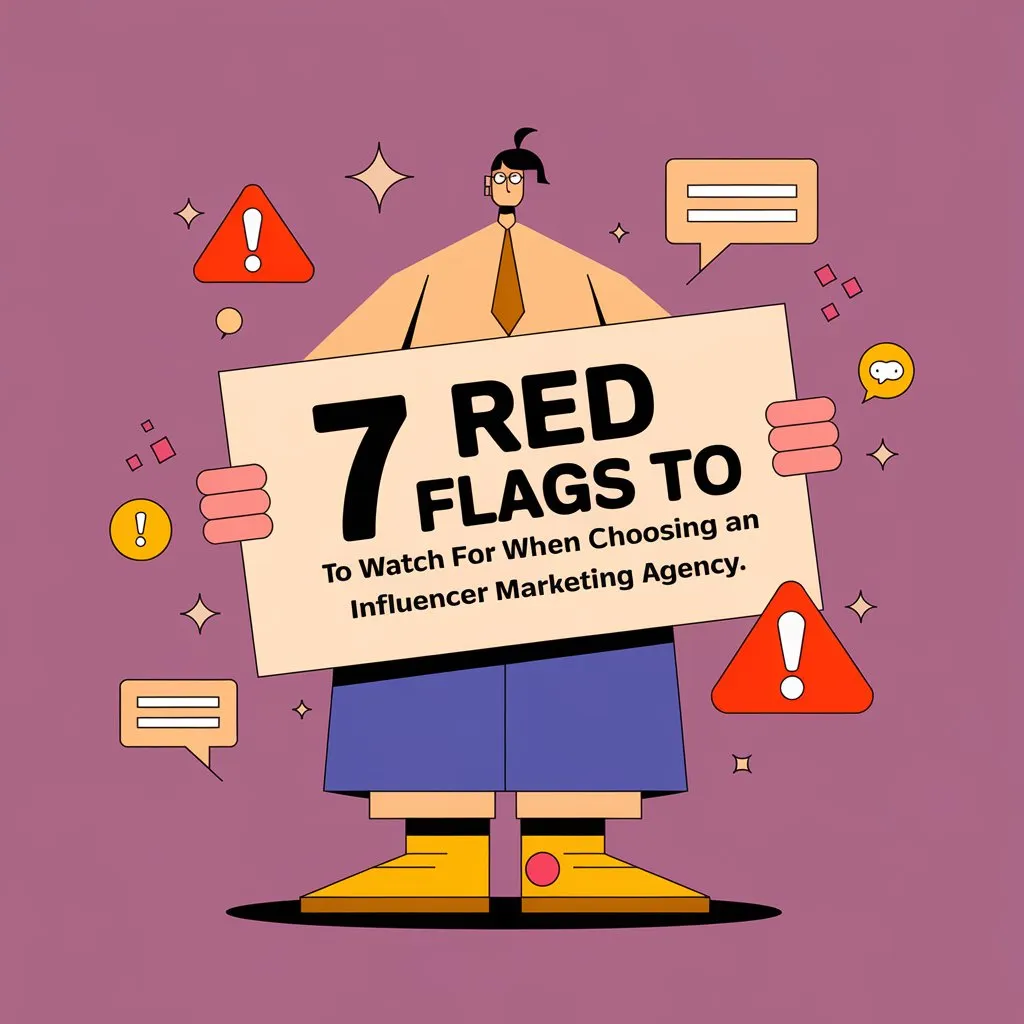Influencer marketing is no longer just a trend; it’s a fundamental part of how modern brands connect with their audience. The right agency can be a powerful partner, driving real growth, building communities, and boosting your bottom line. But the wrong one? The wrong agency can be a costly mistake, wasting your budget, damaging your brand’s reputation, and leaving you with a handful of useless metrics.
The industry is crowded, and it can be hard to tell the true experts from the smooth talkers. As a business owner or marketing manager, your best defence is knowing what to look for—and what to run from. Before you sign any contract or make any commitments, make sure you aren’t seeing any of these seven critical red flags.

Vetting an agency requires a keen eye and the right questions. While many agencies are fantastic partners, some have perfected the art of the sales pitch without having the substance to back it up. To protect your investment and your brand, you need to treat your search process like an audit. The following seven red flags are the critical items on your checklist. If you spot one or more of these during your conversations, it’s a clear signal to proceed with caution—or to walk away entirely.
This is perhaps the most common and most tempting red flag. An agency that promises to make your brand “go viral” is selling you a lottery ticket, not a strategy. Virality is, by its very nature, unpredictable. It’s a mix of timing, cultural relevance, audience sentiment, and a huge dose of pure luck. It cannot be bottled, and it certainly cannot be guaranteed.
A reputable agency will never make this promise. Instead, they will talk about what they can control and deliver. They’ll promise a strategic approach to maximize reach. They’ll guarantee a certain level of engagement based on historical data. They will commit to clear, measurable business goals, like driving a specific number of clicks, generating qualified leads, or increasing sales by a measurable percentage. They focus on building a solid foundation for predictable growth, not on chasing the unicorn of a viral video. Real strategy is about consistency, not miracles.

When you ask an agency about their strategy, you should get a clear, detailed answer. If their response is full of buzzwords like “synergy,” “amplification,” and “authenticity” but lacks a concrete plan, be very careful. A good strategy is a roadmap, not a collection of vague ideas. It should outline the target audience, the type of content, the platforms to be used, and the specific goals of the campaign.
Pay close attention to the metrics they talk about. A questionable agency will focus on “vanity metrics.” These are numbers that look impressive on the surface but don’t actually mean much for your business—things like likes, impressions, and follower counts. While these have a place, they aren’t the main goal. A great agency will talk about business-focused KPIs (Key Performance Indicators). They’ll want to know how the campaign will impact your sales, website traffic, conversion rates, and overall brand sentiment. They connect their work directly to your business’s health.

Your brand is unique. Your audience is unique. Your goals are unique. So why would your influencer marketing strategy be a generic template? A major red flag is an agency that presents you with a standard package or a rigid plan before they’ve taken the time to understand your business. They seem more interested in selling you what they have than in building what you need.
A professional agency, in contrast, will start by asking you a lot of questions. They will want to understand your brand’s values, your past marketing efforts, your target customer’s behaviour, and your definition of success. Their initial proposal will feel like it was made just for you, because it was. They might have a core process, but the strategy itself should be custom-fit to your specific needs. If you feel like you could replace your company’s name with a competitor’s in their pitch deck without changing anything else, they haven’t done their homework.

Clarity is a cornerstone of trust. If an agency is cagey about how they price their services or how they select their influencers, it’s a sign that something is wrong. Their pricing model should be simple and easy to understand. Whether it’s a monthly retainer, a commission based on ad spend, or a flat project fee, you should know exactly what you are paying for and what deliverables you can expect.
The same goes for their process. Ask them how they find and vet influencers. A good agency will have a robust system for checking for things like fake followers, analysing audience demographics, and ensuring the creator’s past content aligns with your brand’s values. They should be able to walk you through their contracting, briefing, and content approval workflow. Secrecy is a sign of either inexperience or inefficiency—or that they have something to hide.

Pay very close attention to how an agency communicates with you before you are a client. This is the period when they should be on their best behaviour, trying to impress you. Are they slow to respond to your emails? Do they show up late for meetings? Is their proposal full of typos and errors?
These aren’t small issues; they are a direct preview of what it will be like to work with them. An agency that is disorganized and unprofessional during the sales process will not magically become efficient and reliable once you’ve signed a contract. A great partner respects your time, communicates clearly and professionally, and meets their deadlines from day one. If the courtship is rocky, the marriage will be a disaster.

Talk is cheap. Results are what matter. An agency that has delivered real results for its clients will be proud and excited to show you the proof. They should have a portfolio of detailed case studies on their website that go beyond just showing pretty pictures. These case studies should outline the client’s goals, the strategy the agency implemented, and, most importantly, the measurable results they achieved.
If they don’t have case studies, or if the ones they have are vague, ask to speak with one or two of their current or former clients. A reputable agency will be happy to connect you. If they hesitate, make excuses, or flat-out refuse, consider it a giant red flag. It likely means they either don’t have happy clients, or they are worried about what those clients might say.

This is a subtle but incredibly important red flag, especially in markets with clear advertising rules. A professional agency knows that influencer marketing is a form of advertising and must adhere to legal and ethical standards. They should proactively bring up things like proper disclosure (using hashtags like #ad or #sponsored) and ensuring that the content is truthful and not misleading.
If an agency seems unaware of or unconcerned with these rules, they are putting your brand at risk. A campaign that violates advertising standards can lead to consumer backlash, formal complaints, and even legal trouble. A great agency doesn’t just protect their own reputation; they protect yours, too. Their expertise should include not just marketing, but marketing responsibly.

If you’re looking for an influencer marketing partner that blends creativity with compliance, Jive PR + Digital can help. Our team builds campaigns that not only connect authentically with your audience but also follow the latest advertising and disclosure guidelines—protecting both your brand’s reputation and your bottom line. Learn more about our full-service influencer marketing solutions.